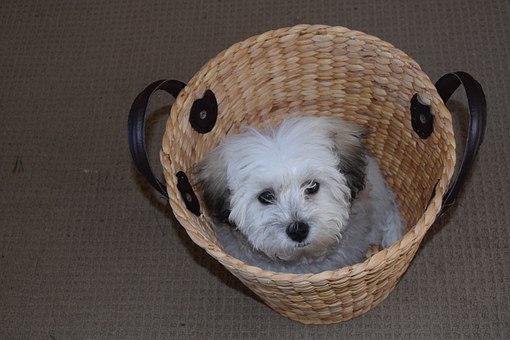Why is my Maltese Puppy Crying and Upset? Help!
Getting a Maltese puppy is a major adjustment for the puppy and for the household. When a new Maltese puppy arrives in the home it can be regarded as a very similar situation to when a new baby arrives into a home. There is always the chance of at least a few unsettled nights ahead. Just like a human baby, a Maltese puppy communicates what it needs to its owner by crying.
It is often very hard to figure out what your Maltese puppy needs especially when you think you have met all of the necessary needs for your puppy. This early time in this new situation will be a learning process for you and an adjustment process for the Maltese puppy, but it is often hard to figure out why your Maltese puppy is unhappy right now. In order to get the best results and to stop your puppy from crying it is generally a good idea to try and figure out the real reasons behind why the Maltese dog is crying so you can actually address the problem or their need. To help you identify the reasons a Maltese puppy is crying we have identified the most common reasons below in the this article. So lets get into the reasons:
Sickness
Puppies will tend to cry when they are not feeling well. Being ill is a very common reason Maltese puppies cry. They cry because Maltese puppies have no other way to communicate to tell you that they are feeling unwell. Their crying is not to annoy you but is simply their way of alerting you to the fact that something is wrong with them. If your Maltese puppy is crying or whimpering for an extended period of time it could be that they are sick. Aside from crying and whimpering, other symptoms of illness include being lethargic, diarrhea, vomiting, lack of appetite, dizziness and any change of their breathing rate, particularly increased or rapid breathing and panting. If these symptoms are combined with any kind of biting, scratching or licking it could be that the Maltese puppy has an allergy, skin irritation or a parasite. Another sign that your Maltese puppy may be in pain is if their character or demeanor changes. When a normally happy Maltese puppy now hides or runs away from you, then they could be displaying these behaviors because of pain or injury.
If you feel that your Maltese puppy is crying or whimpering due to pain it is important to get them veterinary help as soon as possible. Puppies can progress with sickness very quickly so acting fast is very important when it comes to a Maltese puppy’s health.
Loneliness

Dogs are companion animals by nature and are very social. Because they like to be park of a pack they like to be around people or other dogs and not left alone. This is particularly true when it comes to Maltese puppies. Maltese puppies are essentially babies and have only just recently been separated from their mother and siblings and this can be a big adjustment for them. You should keep in mind that Maltese puppies like to be near people throughout the day. If you are able to do it, then it is a good idea to keep the Maltese puppy around you where possible so they feel more secure. This can be done by getting your Maltese puppy a crate or playpen in the main living area so that it has its own space but they are still near you. This will make the Maltese puppy feel secure. They really just want to feel like they are part of the family and be around people as nature has conditioned them to feel safe in a pack. Where possible and where it is safe to do so it is a good idea to let your Maltese puppy wander around and follow you as you are doing daily tasks. This keeps the Maltese puppy mentally stimulated and occupied and will make them tired but also allows them to be around you which will create a great bond. If you leave a Maltese puppy alone and segregate them from the family and from you then they will feel anxiety and this will most likely lead to crying and whimpering. Do keep in mind that Maltese puppies are still babies and need attention and company to feel safe and secure.
Fear
Maltese Puppies will often cry or whimper because they are scared and frightened. Remember that your Maltese puppy has been separated from their mother and siblings and placed in a new and strange environment to them with people they do not yet trust. As they grow and explore the world around them they often experience fear. This can come from many sources and from many directions. One of the most common examples of them getting frightened is when they encounter a new person they do not know. The other biggest fear for a Maltese puppy is a loud or unexpected noise like thunder or fireworks. It is the unknown and the unexpected which bring on the fear and this can manifest in crying.
Science has proven that dogs have “fear periods” which are times in their life and development in which they are more likely to be afraid of new things. This can seem very sudden to their owners and something that never bothered them before now makes them fearful. You should keep in mind that this is very normal and is part of their behavioral development. These “fear periods” typically occur at 8-12 weeks, 4-9 months and again at 1.5-2 years old. Fear is shown by Maltese dogs in their body language. They may all display it slightly differently but there are tell tale signs which you can look out for. When Maltese dogs are afraid they will often hide or become withdrawn, they can also whimper and cower, it is all about body language when seeing fear in your Maltese dog. When you notice these signs in your Maltese puppy you can help them by removing them from the situation immediately. If a dog is exposed to a fear inducing situation for too long or too often then the fear can become ingrained in them and this is then hard to overcome. You see this with dogs who are scared of thunder all their lives or scared of wooden floors. These fears can create anxiety and develop into phobias.
To help them cope with fearful situations, it is recommended that you expose your Maltese dog to lesser intense versions of their fear to build up a tolerance or a normalcy with their fear. An example is that if your Maltese puppy is fearful of thunder then it is a good idea to play thunder noises on a low volume in the background at random times. You can then increase the volume as your Maltese puppy becomes accustomed to the thunder noise and is no longer bothered or fearful of it. However if you are very concerned about your Maltese dog’s fear level or reactions to certain things then it is a good idea to speak to your dogs veterinarian and get some professional advice. Your vet can help with a lot of behavioral problems by giving you tips and tricks to try with your specific Maltese.
Hunger

If your Maltese puppy cries a lot around meal time then their crying could be attributed to hunger. Puppies grow so quickly that their appetites can vary substantially from one day to the next day. Some days your Maltese puppy might be famished and eat a lot and other days it may not be as interested in its food at all. This is a very normal situation as their growth phases vary and this can impact on their appetite. As a rule of thumb it is a good idea to feed your Maltese dog according to what is recommended for their age. You can usually see the recommended intake on the packaging of their food. This means that you will know how much to feed them without giving them too much for their age and breed. If you feel that your Maltese puppy is crying out of hunger despite being given the recommended amount of food you should consult with your puppies veterinarian about any diet changes. It is also a good idea to actually look at your Maltese dogs body frame and their weight. If you think that your Maltese puppy is looking too thin then you should increase its food intake and along the same lines if they are developing a weight problem you may look at decreasing the food provided. Maltese can be both underweight and overweight, but generally the breed is known for being small picky eaters and you will find a lot more Maltese dogs under weight compared to obese Maltese dogs.
Boredom
Maltese puppies are extremely energetic and have very high mental and physical needs that they need to be met daily to ensure that they are not bored. Maltese puppies will often cry out of boredom. This is because they are not having their mental and physical needs met so they are not tired or fulfilled. Maltese puppies need daily exercise to expend all the energy they have, which means plenty of playing and walks to make sure that they are using all this energy. Mentally tiring out puppies is also very important which is why it is good to have a variety of toys and puzzles that they can have access to. The best Maltese dog toys are ones which dispense food as it is very good for the Maltese puppy’s mental stimulation as they have to work to get the treat and this keeps them very focused and entertained. Simple games you can play with them like hide and seek will also mentally tire them out whilst having fun and bonding with you. Another way to tire them out is to let your Maltese puppy follow you around all day as you do your daily tasks. This will get them moving and will mentally stimulate them as they will be wondering what you are doing. The bottom line with Maltese puppies is that a puppy who is physically and mentally fulfilled will not cry out of boredom as they will be too tired.
Did we answer your Question on why your Maltese puppy might be crying?
Hopefully this article has been able to answer your questions and give you some tips on why your Maltese may be crying. If you know of any other reasons or have some tips for our readers on identifying the reasons for Maltese puppy crying let us know in the comments. Hopefully if your Maltese puppy is crying or upset you can identify the cause and help your gorgrous pet with its problem.


4 thoughts on “Why is my Maltese Puppy Crying and Upset? Help!”